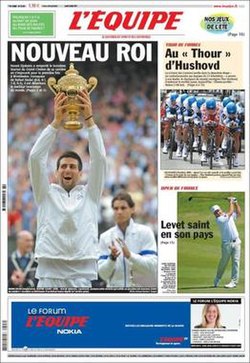L’Équipe

The front page of L'Équipe on 4 July 2011
|
|
| Type | Daily newspaper |
|---|---|
| Format | Broadsheet |
| Owner(s) | Éditions Philippe Amaury |
| Editor | François Morinière |
| Editor-in-chief | Fabrice Jouhaud |
| Founded | 1946 |
| Language | French |
| Headquarters | Boulogne-Billancourt |
| Sister newspapers | Le Parisien |
| ISSN | 0153-1069 |
| Website | www |
L'Équipe (pronounced [leˈkip], French for "the team") is a French nationwide daily newspaper devoted to sport, owned by Éditions Philippe Amaury. The paper is noted for coverage of football (soccer), rugby, motorsport and cycling. Its ancestor was L'Auto, a general sports paper, whose name reflected not any narrow interest but the excitement of the time in car racing.
L'Auto originated the Tour de France cycling stage race in 1903 as a circulation booster. The race leader's yellow jersey (maillot jaune) was instituted in 1919, probably to reflect the distinctive yellow newsprint on which L'Auto was published. The competition that would eventually become the UEFA Champions League was also the brainchild of a l'Équipe journalist, Gabriel Hanot.
L'Auto and therefore L'Équipe owed its life to a 19th-century French scandal involving soldier Alfred Dreyfus - the Dreyfus affair. With overtones of antisemitism and post-war paranoia, Dreyfus was accused of selling secrets to France's old enemy, the Germans.
As different sides of society insisted he was guilty or innocent – he was eventually cleared but only after rigged trials had banished him to an island prison camp – the split came close to civil war and still have their echoes in modern French society.
France's largest sports paper, Le Vélo, mixed sports coverage with political comment. Its editor, Pierre Giffard, believed Dreyfus innocent and said so, leading to acrid disagreement with his main advertisers. Among them were the automobile-maker the Comte de Dion and the industrialists Adolphe Clément and Édouard Michelin.
...
Wikipedia
